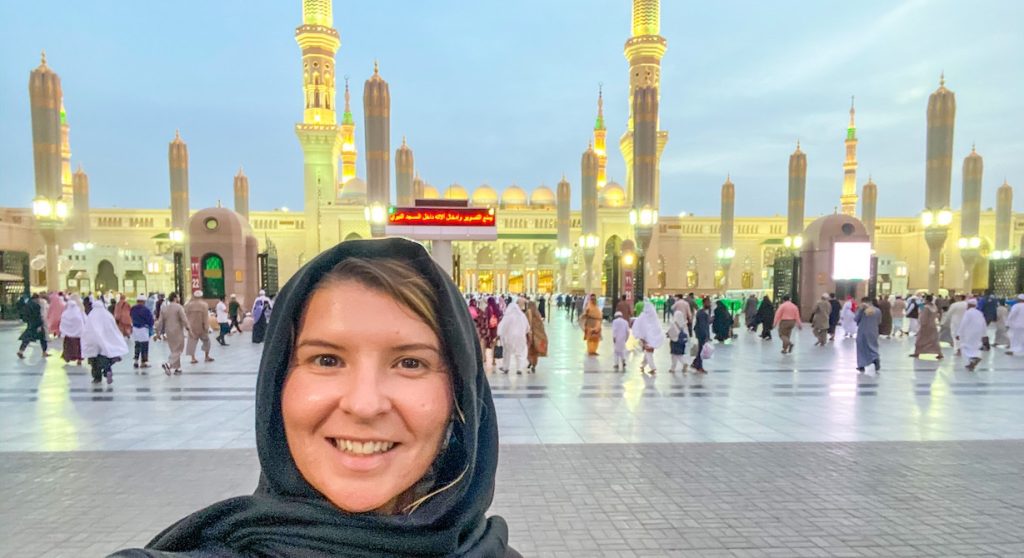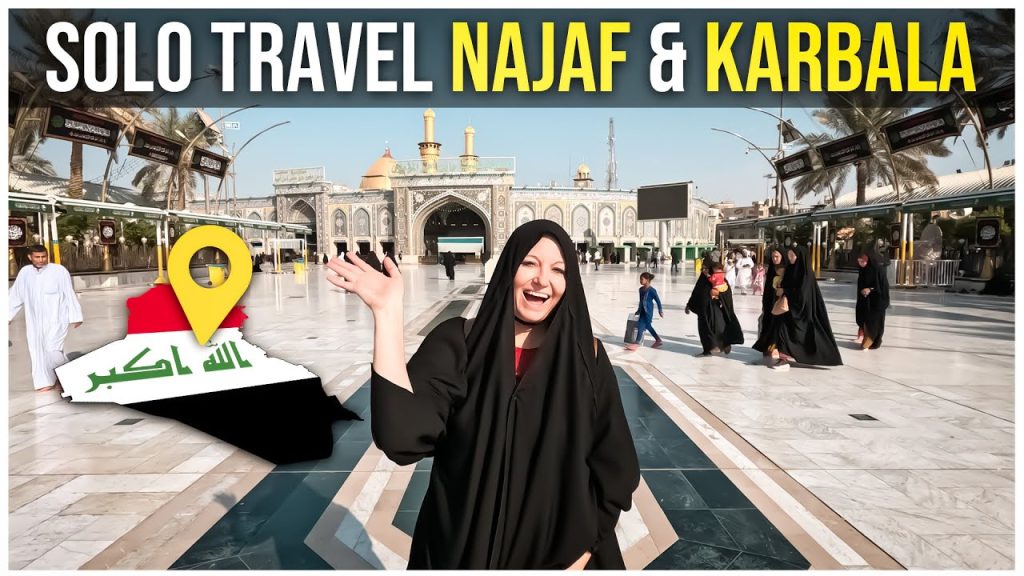The pilgrimage to Karbala and Najaf offers profound spiritual experiences, transcending religious boundaries to unite individuals from diverse backgrounds. “Spiritual Experiences and Significance for Pilgrims” encompasses the deeply personal encounters and realizations pilgrims undergo during their journey. Regardless of religious affiliation, pilgrims experience moments of reverence, emotional connection, and spiritual renewal, fostering unity and community. In this article we discuss Non-Muslim Experiences in Karbala and Najaf.

Spiritual Experiences and Significance for Pilgrims
The concept of “Spiritual Experiences and Significance for Pilgrims” refers to the deeply personal encounters and profound realizations that individuals experience during their pilgrimage to Karbala and Najaf. It encompasses moments of intense reverence, emotional connections, and spiritual renewal as pilgrims reflect on the sacrifices of Imam Husayn and other revered figures. The pilgrimage fosters a sense of unity and community among participants, transcending differences in background and beliefs. Many pilgrims describe feeling spiritually refreshed and inspired, encountering moments of divine closeness and undergoing personal transformation. Overall, this concept highlights the pilgrimage’s ability to evoke profound spiritual experiences and insights for individuals from diverse backgrounds.
Does people of non-muslim background have this awe?
Yes, individuals from non-Muslim backgrounds can indeed experience a sense of awe and profound spiritual encounters during their pilgrimage to Karbala and Najaf. While they may not share the same religious beliefs as Muslim pilgrims, non-Muslims often approach these sacred sites with openness and reverence for their historical and cultural significance.
For non-Muslims, the awe-inspiring architecture, rich history, and vibrant religious rituals in Karbala and Najaf can evoke a sense of wonder and admiration. Additionally, witnessing the devotion and spiritual fervor of fellow pilgrims, regardless of their own religious affiliation, can be deeply moving and impactful.
Moreover, the universal themes of sacrifice, justice, and resilience embodied in the story of Imam Husayn’s martyrdom resonate across religious boundaries. Non-Muslim pilgrims may find inspiration and spiritual meaning in these themes, leading to moments of reflection, introspection, and personal growth.
Overall, while the experiences and interpretations may vary, individuals from non-Muslim backgrounds can certainly encounter moments of awe and spiritual significance during their pilgrimage to Karbala and Najaf.

how this awe affect people of non muslim who don’t visit shrine?
Even for those who don’t physically visit the shrines of Karbala and Najaf, the awe-inspiring essence of these sacred sites and their spiritual significance can leave an indelible impression. Through learning about their historical and cultural importance, individuals from non-Muslim backgrounds can develop a deeper appreciation for the rich tapestry of Islamic heritage. This understanding fosters respect for diverse religious traditions and often catalyzes engaging intercultural dialogues.
Moreover, the stories and events surrounding Karbala and Najaf captivate not only pilgrims but also scholars, artists, and writers globally. Through literature, art, and music, these narratives permeate various cultural spheres, serving as a source of inspiration and reflection for individuals irrespective of their religious affiliations. This artistic expression transcends religious boundaries, offering a common ground for people to engage with universal themes of courage, resilience, and justice.
Non-Muslim Experiences in Karbala and Najaf
Furthermore, delving into the pilgrimage to Karbala and Najaf encourages profound reflection on shared human experiences. Even in absence of physical visitation, individuals can contemplate the moral and ethical lessons embodied in the stories of sacrifice and determination. These universal themes often serve as guiding principles, inspiring individuals to embody courage and stand up against oppression in their own lives and communities.
Ultimately, while the direct impact may vary for those who do not undertake the pilgrimage, the spiritual allure and cultural significance of Karbala and Najaf have a lasting effect on individuals from non-Muslim backgrounds. They contribute to broader conversations on interfaith understanding, cultural appreciation, and the shared values that unite humanity across religious divides.
Discovering Humanity Together: Non-Muslim Experiences in Karbala and Najaf
The pilgrimage to Karbala and Najaf isn’t solely for Muslims; it’s a journey where people from all backgrounds discover shared humanity. Non-Muslims participating in this pilgrimage encounter profound experiences that transcend religious differences. They witness unity amidst diversity, as individuals from various faiths come together in reverence and respect for the sacred sites. In Karbala and Najaf, non-Muslim pilgrims find themselves drawn into a cultural tapestry rich with spiritual significance. They gain insights into the stories of sacrifice and resilience, particularly from the legacy of Imam Husayn, which offers universal lessons applicable to all. These pilgrims engage in acts of compassion, extending help and support to fellow pilgrims regardless of religious affiliation. As they walk the spiritual paths of Karbala and Najaf, non-Muslims find meaning and connection, experiencing personal growth and spiritual awakenings. Their presence underscores the power of shared human experiences and the potential for unity beyond religious boundaries. Through their participation, non-Muslims contribute to building bridges of understanding and dialogue, enriching the interfaith fabric of these sacred pilgrimage sites.
Experience of Non-Muslim of Karbala pilgrimage
Non-Muslims can participate in the Karbala pilgrimage, particularly during Arbaeen. It offers a unique opportunity to witness an inclusive and harmonious society transcending barriers of color, race, religion, and language. Visiting the Shrine of Imam Hussain during Arbaeen allows individuals to experience a vision of utopia firsthand. Here, humanity shines brightly, reflecting purity and clarity like glass. The pilgrimage is a testament to a society built on principles of peace, freedom, and morality. It welcomes people from all walks of life to come together in unity and reverence, fostering a sense of belonging and shared humanity. Therefore, for those seeking to witness the beauty of diversity and the power of collective devotion, the Karbala pilgrimage presents an unparalleled opportunity to experience these ideals in action.
Pilgrimages like Karbala
Pilgrimages around the world vary in their cultural, religious, and spiritual significance, but they often share similarities with the Karbala pilgrimage in terms of communal devotion, spiritual reflection, and a sense of shared purpose. Here are a few examples:
Camino de Santiago (Spain): Also known as the Way of St. James, the Camino de Santiago is a network of pilgrimages leading to the shrine of the apostle St. James the Great in the Cathedral of Santiago de Compostela in Galicia, Spain. It has been an important pilgrimage route since the Middle Ages and attracts people of all faiths and backgrounds seeking spiritual growth, self-discovery, and cultural exchange.
Kumbh Mela (India): The Kumbh Mela is a Hindu pilgrimage that takes place at four sacred sites in India—Haridwar, Prayagraj (formerly Allahabad), Nashik, and Ujjain—rotating every three years. It is considered the largest religious gathering on earth, with millions of devotees bathing in the sacred rivers to cleanse themselves of sin and attain spiritual liberation.
Lourdes (France): Lourdes is a major pilgrimage site for Catholics, known for its association with the apparitions of the Virgin Mary to a young girl named Bernadette Soubirous in 1858. Pilgrims visit the Sanctuary of Our Lady of Lourdes seeking healing, spiritual renewal, and consolation, often participating in rituals such as bathing in the waters of the Lourdes Grotto.
. **Varanasi (India): Varanasi, also known as Kashi or Benares, is one of the oldest continuously inhabited cities in the world and a major pilgrimage site for Hindus. Devotees visit Varanasi to bathe in the sacred waters of the Ganges River, perform rituals, and seek spiritual purification and liberation from the cycle of rebirth.
All of above pilgrimage modes are restricted to their own realm
Karbala stands out as a pilgrimage site that transcends all differences due to its universal significance and message of justice, sacrifice, and unity. Unlike many other pilgrimage sites that are associated with specific religious or cultural traditions, Karbala holds profound meaning for people of diverse backgrounds. The story of Karbala, particularly the martyrdom of Imam Husayn, resonates with humanity’s collective struggle against oppression and injustice, regardless of religious affiliation.
The events of Karbala embody universal themes that speak to the human experience, such as courage in the face of adversity, unwavering commitment to principles of justice, and the enduring legacy of sacrifice for the greater good. As a result, Karbala has become a symbol of resistance, resilience, and solidarity for people worldwide, transcending boundaries of religion, nationality, and ethnicity.
Moreover, the annual pilgrimage to Karbala, particularly during Arbaeen, is characterized by inclusivity and hospitality, with millions of pilgrims from diverse backgrounds coming together in a spirit of unity and compassion. This communal gathering reflects the universal appeal of Karbala as a place of pilgrimage where individuals can connect with shared values, find solace in collective devotion, and reaffirm their commitment to the pursuit of justice and righteousness. Therefore, Karbala’s ability to transcend differences lies in its profound spiritual significance and its message of hope, compassion, and solidarity that resonates with people of all walks of life.
Final thought
In conclusion, Karbala’s unique ability to transcend all differences stems from its universal significance and the timeless message it embodies. Unlike many other pilgrimage sites, Karbala’s story of sacrifice and resilience speaks directly to the core of the human experience, resonating with people of diverse backgrounds. Through the martyrdom of Imam Husayn and the events of Karbala, individuals find inspiration in the universal themes of justice, courage, and compassion. The pilgrimage to Karbala, particularly during Arbaeen, serves as a powerful symbol of unity, bringing together millions of pilgrims from around the world in a shared journey of spiritual renewal and collective devotion. In Karbala, barriers of religion, nationality, and ethnicity fade away, replaced by a profound sense of solidarity and interconnectedness. Ultimately, Karbala’s enduring legacy lies in its ability to unite humanity in pursuit of truth, justice, and righteousness, making it a spiritual haven for pilgrims of all backgrounds, transcending all differences.




